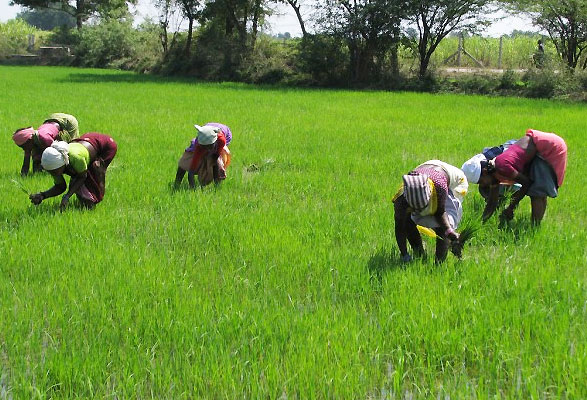Boko Haram militants, drought and pests have combined to wreak havoc on farmlands in Borno State, leading to low output and huge losses to the farmers.

About 1,800 hectares of rice for instance wilted due to drought in some parts of the state, according to the farmers.
The News Agency of Nigeria (NAN) reports that some of the rice farms were also affected by pest infestation.
A cross section of the farmers who spoke to NAN at the Biriri and Koshebe rice plantations said that the destruction, by the combined forces, dashed their hope of bumper harvest.
Hajja Amina Isa, a rice grower, blamed the pests and drought for her woeful cropping season.
Isa said that she planted her crops several weeks into the rainy season, adding that the rain stopped before the plants matured.
“There were delays in the distribution of farm inputs to enable us cultivate our land on time.
“Few weeks after planting the fields; the rain stopped. We complained, water pumps and tube wells were provided to enable us save the plants through irrigation. Nonetheless the plants wilted.
“Ravaging quelea birds further destroyed what remained of the plantations”.
Another farmer, Malam Bashir Gwoni-Ali, alleged that about 400 hectares of rice was destroyed by Boko Haram insurgents at various plantations in Mafa local government area of the state.
Gwoni-Ali said that the insurgents burnt and destroyed the produce at their farms.
He listed the affected farmlands to include Koshebe, Kachemari, Juwano and Dinge.
“I and other farmers cultivated rice and recorded bumper harvest despite threats by the insurgents.
“Unfortunately the insurgents destroyed the produce and we are left with nothing,” Gwoni-Ali alleged.
Also commenting, Grema Musa, the Secretary of the Coordinating Team, Walwane Agricultural Supply Company, one of the Anchor Borrower clients, disclosed that the company registered about 13,000 rice farmers in the state.
Grema disclosed that fertilisers, seeds, chemicals, knapsack sprayers, tube wells and water pumps were distributed to the farmers.
He added that funds were also disbursed to the farmers to facilitate farm labour activities such as tractor services, ploughs, harrowing and processing.
The secretary revealed that the company had so far mopped up 35,000 tonnes of paddy rice from the benefiting farmers.
He said: “We took stock of 27,000 tonnes of the commodities in Maiduguri and another 8,000 tonnes in Biu.
“More than 1,800 hectares of farmlands were destroyed due to drought and pest infestation”.
Grema listed the affected plantations as Juwano, Koshebe, Moloi, Auno, Jimtolo, Azia, Gongolon, Biriri and Masiya.
According to him, the company had filed a formal complaint to the Nigeria Agricultural Insurance Corporation (NAIC), to enable it assess the damage.
He called on farmers to repay their loans to enhance participation and ensure sustainability of the programme
The News Agency of Nigeria (NAN) reports that about 18,000 registered farmers were supported under the Anchor Borrower scheme during the 2016/2017 raining season activity in the state.
Anchor Borrower is a critical component of the Federal Government’s agriculture transformation programme designed to achieve self sufficiency in rice production.
The programme is being run in collaboration between the Central Bank, Bank of Agriculture (BOA) and state governments
By Rabiu Sani
